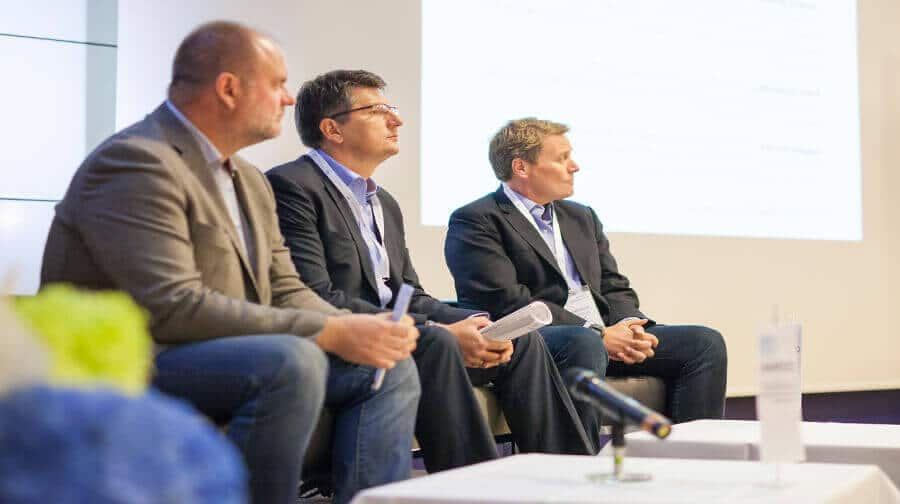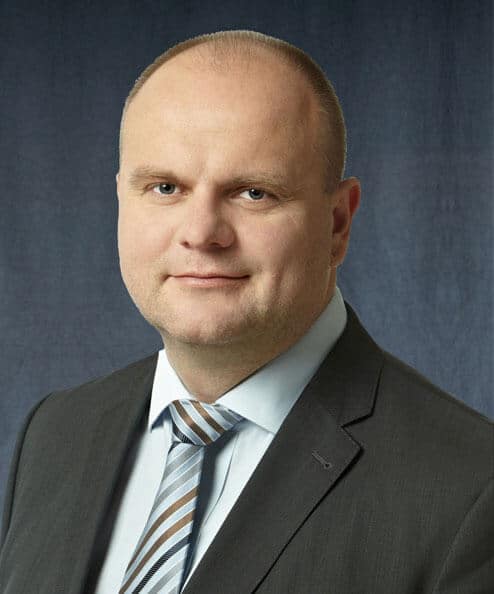Kaspars Kauliņš: Future leaders will be orchestrating talent pools without actually having met their teams
Talinn, Estonia – Knowledge management, knowledge productivity, customising educational processes, lifelong learning systems (LLL) were among the main concepts discussed at the 24th “Management Education for a Digital World” CEEMAN Annual Conference, which took place in Tallinn, Estonia at the end of September.

The event, hosted by the Tallinn School of Economics and Business Administration (TSEBA), gathered over 160 participants from 34 countries. It provided an interactive platform for sharing insights about the impact of technology on education, the workplace, job markets, etc. from business, technology and recruitment perspectives, and also discussed the repercussions on the curricula and study processes of business schools which aim to prepare the students for these challenges.
The Business Keynotes: Digitalization and Its Impact on Business School Markets and Competition panel was moderated by Seán Meehan, Martin Hilti Professor of Marketing and Change Management, CEEMAN Board member, IMD, Switzerland and included contributions by Thomas Marschall, Disruption Advisor, Business Angel Investor, Denmark; Ratko Mutavdzic, Director Cloud Services, Microsoft CEE, Croatia, and Kaspars Kauliņš, Country Manager Estonia at Pedersen & Partners.
“The formal structure of organisations is going to disappear. Future leaders will be orchestrating talent pools without the chance to actually physically meet with every individual of their talent pool, and will have to rely even more on technology in the future,” stated Kaspars Kauliņš, Country Manager Estonia at Pedersen & Partners. He added: “The major problems faced by graduates in light of inconsistent curricula are related to social skills. Communication, the ability to manage emotions and human conflicts, physical communication with the audience, sensitivity and empathy must gain priority on business school topic lists.”
The breakneck pace of artificial intelligence development and technological advancement into our daily activities should also be reflected in the way future businessmen and entrepreneurs are groomed – developing computational capabilities and creative thinking constitute major challenges for future leaders, as unilateral job responsibilities cease to exist in modern corporations, and employees are expected to be able to develop both horizontally and vertically.
“Business schools will have to adapt to the faster evolution of knowledge. The linear development of knowledge is becoming exponential and this really makes a big difference, because change has always been present. Disruption is the new word for change, but it’s the pace of change that is different. And this all relates to computer processing capacity, and what will be possible in the next few years. So many new advances are possible at such a low cost, and that brings a lot of new opportunities and threats,” said Thomas Marschall, one of the panellists.
Kaspars Kauliņš concluded: “I believe there are three pillars to engagement: involvement, empowerment, and providing purpose. Vision is how we show where we are heading. We live in times when long-term strategies aren’t relevant anymore, and change is quick. The ability to create purpose and deliver it to people, regardless of the channel, will be very important in the future.”
Image and video source: http://www.ceeman.org/news/24th-ceeman-annual-conference-successfully-concludes
 Kaspars Kauliņš is the Country Manager for Estonia at Pedersen & Partners. Mr. Kauliņš brings over twenty years of solid expertise in Executive Search, organisational development, HR and strategic business consulting. Throughout his career, Mr. Kauliņš has held various senior positions within the Consumer Products (FMCG), Financial Services, Professional Advisory, and IT & Telecommunications industries, including Managing Director for the Estonian Business Centre in Riga, and Managing Director and Chairman of the Supervisory Board for a regional Executive Search firm. He has also held senior HR positions with Hansabank, Swedbank Group, and has served as the Group HR Director for SPI Group. Moreover, he has worked as the International Business Development Director at the largest ITC Company in the region. Prior to joining Pedersen & Partners, Mr. Kauliņš was a leadership & strategy consultant with one of the leading training companies in Latvia, and he currently teaches Strategic Human Resources Management at the Stockholm School of Economics (SSE) in Riga.
Kaspars Kauliņš is the Country Manager for Estonia at Pedersen & Partners. Mr. Kauliņš brings over twenty years of solid expertise in Executive Search, organisational development, HR and strategic business consulting. Throughout his career, Mr. Kauliņš has held various senior positions within the Consumer Products (FMCG), Financial Services, Professional Advisory, and IT & Telecommunications industries, including Managing Director for the Estonian Business Centre in Riga, and Managing Director and Chairman of the Supervisory Board for a regional Executive Search firm. He has also held senior HR positions with Hansabank, Swedbank Group, and has served as the Group HR Director for SPI Group. Moreover, he has worked as the International Business Development Director at the largest ITC Company in the region. Prior to joining Pedersen & Partners, Mr. Kauliņš was a leadership & strategy consultant with one of the leading training companies in Latvia, and he currently teaches Strategic Human Resources Management at the Stockholm School of Economics (SSE) in Riga.
Pedersen & Partners is a leading international Executive Search firm. We operate 56 wholly owned offices in 52 countries across Europe, the Middle East, Africa, Asia & the Americas. Our values Trust, Relationship and Professionalism apply to our interaction with clients as well as executives. More information about Pedersen & Partners is available at www.pedersenandpartners.com
If you would like to conduct an interview with a representative of Pedersen & Partners, or have other media-related requests, please contact: Diana Danu, Marketing and Communications Manager at: diana.danu@pedersenandpartners.com
